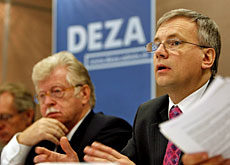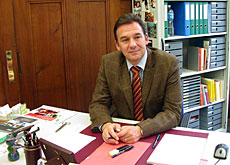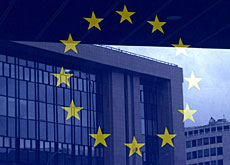Swiss see mutual benefit in payments to new EU

Implementing Switzerland's SFr1 billion ($890 million) payment to new EU members will create opportunities for all sides, according to two cabinet ministers.
Swiss Foreign Minister Micheline Calmy-Rey and Economics Minister Doris Leuthard were speaking at a conference on cooperation with eastern Europe on Thursday.
The framework agreements for the contribution are expected to be ready for signing this year.
The Swiss view on the benefits was shared by government representatives of the new European Union member states present in Lucerne.
Calmy-Rey, who is this year’s Swiss president, noted that it was remarkable that a popular decision formed the basis for the Swiss enlargement contribution. “That a country’s policy on foreign assistance is decided directly by the people is likely to be unique,” she said.
In November 2006 Swiss voters approved the Federal Act on Cooperation with the Countries of Eastern Europe. This forms the basis for the Swiss enlargement contribution, a SFr1 billion package to the ten members of the European Union who joined in May 2004.
Switzerland is not a member of the EU, but the EU is its main trading partner. The government has previously said that some 60 per cent of the payments – SFr30 million annually over a ten-year period – would come from both the foreign and economics ministries.
Leuthard underlined the fact that the indirect impacts of the enlargement contribution on the Swiss economy would be far greater than the direct effects.
“Well-implemented projects with Swiss involvement are the best form of advertising for our country and our economy. This will lead indirectly to the development of a favourable environment for our firms to establish new business links.”
She told swissinfo: “The contracts are ready to sign. We’re going to discuss the details, the procedures and how we can handle the projects. I’m very optimistic.”
“Swiss experience”
The Czech foreign minister, Karel Schwarzenberg, Lithuania’s finance minister, Rimantas Šadžius, and the Polish economic affairs minister, Piotr Grzegorz Woźniak, highlighted their experiences with EU support and the additional opportunities that the Swiss contribution can make.
“The Swiss contribution is not only money but the humanitarian dimension, cooperation between people and the exchange of experience, ideas and views,” Šadžius told swissinfo.
Czech foreign minister Karel Schwarzenberg said Switzerland was going in the right direction in concentrating on the Vysehrad countries: the Czech Republic, Slovakia, Poland and Hungary.
“I think it’s a very good idea to specialise, to take one territory and do profound research and concentrate on the most reasonable projects,” he told swissinfo.
Schwarzenberg said these projects included “the environment, schools – very important – and restructuring towns and villages to give them the chance to learn from the Swiss experience”.
Smooth running
The directors of the agencies responsible for the implementation of the enlargement contribution, Jean-Daniel Gerber from the State Secretariat for Economic Affairs (Seco) and Walter Fust from the Swiss Agency for Development and Cooperation (SDC), said the operational implementation of the enlargement contribution was largely ready.
Particular measures are being taken both in Switzerland and in the partner countries to ensure the efficient use of resources.
The framework agreements with all ten new EU member states are expected to be ready for signing this year. As soon as the agreements have been signed, the implementation of programmes and projects can begin.
To assure their smooth running, Switzerland is establishing offices in Warsaw, Budapest, Prague and Riga. These are affiliated to the Swiss embassies and will be run by a Swiss expert.
swissinfo
Switzerland has been granting financial aid to countries in eastern Europe to help them transform into market economies.
As part of the second set of bilateral treaties with Brussels, non-EU member Switzerland pledged to provide SFr1 billion to ten new EU member states mainly in eastern Europe.
Under the accord, almost half the funding will go to Poland. Hungary will benefit to the tune of SFr131 million, while the Czech Republic will receive SFr110 million.
Since 1990 Switzerland has spent SFr3.5 billion on about 1,000 aid projects in eastern Europe after the collapse of communism.
So far non-EU member Switzerland has agreed 16 bilateral treaties with the 25 EU member states, including the ten countries which joined in 2004.
Breakdown of Swiss contribution to eastern European states (in SFr):
Poland: 489,020,000; Hungary: 130,738,000; Czech Republic: 109,780,000; Lithuania: 70,858,000; Slovakia: 66,866,000; Latvia: 59,880,000; Estonia: 39,920,000; Slovenia: 21,956,000; Cyprus: 5,988,000; Malta: 2,994,000.

In compliance with the JTI standards
More: SWI swissinfo.ch certified by the Journalism Trust Initiative



You can find an overview of ongoing debates with our journalists here. Please join us!
If you want to start a conversation about a topic raised in this article or want to report factual errors, email us at english@swissinfo.ch.